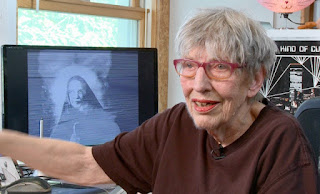Guerrilla Television Symposium April 19-21 in Chicago
Minnesota Media Arts was well represented at the April 19, 2024 Guerrilla Television: “The Revolutions of Early Independent Video” a symposium co-presented by the University of Chicago Department of Cinema and Media Studies, Media Burn Archive and Video Data Bank Media Burn is working on a three year CLIR grant to digitize the “Hidden Collections” of early video media centers across the United States.
Ron McCoy, MNMA’s board member and media archive producer, was also one of the original founding members of University Community Video in 1973 at the West Bank campus of the University of Minnesota.
UCV was an active participant in the Guerrilla Television movement, offering educational and hands-on training, producer assistance and content distribution, through their award winning broadcast TV series “Changing Channels 1974-1978. The majority of the series content was both produced and edited on the new EIAJ ½” and ¾” Umatic portable video formats before being uploaded to 2” Quad tape for broadcast. The broadcast series was aired on the Twin Cities PBS affiliate KTCA -TV Channel 2. Mpls/S. Paul in 1974 was the 13th largest TV market. This broadcast exposure was accomplished through UCV’s relationship with the University of Minnesota’s Media Resources Department, utilizing an existing airtime contract for educational television programming.
Ron participated in the symposium’s opening evening’s screenings, presenting an excerpt from CC’s 1974’s program, ‘The Business of TV News, produced by Stephen Kulczycki and Jim Mulligan.
See the 21 Minute program at MNHS's Finding Aid link hre ...
The symposium was a wonderful event covering the history, breadth and scope of the Guerrilla Television movement. See program link
Ron also had the opportunity to reconnect with Deirdre Boyle, author of Subject to Change: Guerrilla Television Revisited. UCV was one of three Alternative Media Centers featured in the book.
 |
| Ron McCoy & Deirdre Boyle |






Comments
Post a Comment